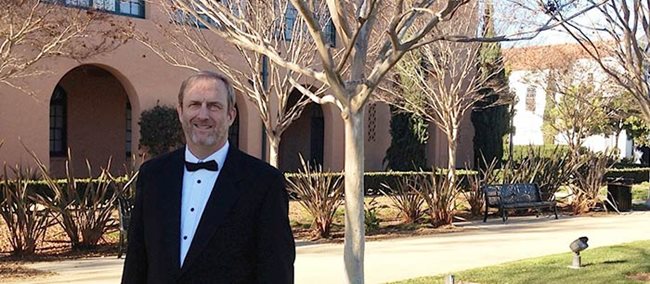20 January 2015
The art of fundraising for worthy causes: 'You can make a positive difference'

David Pierce: "I always tell my students that the best thing about grant writing and fundraising is the good karma you generate."
INSTRUCTOR PROFILE:
David Pierce is something of a pioneer in grant writing, fundraising and development, having started nearly 35 years ago in his home state of Washington.
As he details below, it took a life-changing volcanic eruption to launch his career.
A UC San Diego Extension instructor in Grant Writing for Nonprofits, he’s also vice president and co-director of development for the San Diego Gay Men’s Chorus.
Over his career, he has earned four academic degrees – two master’s in English and creative writing from San Diego State University, and a business administration degree from Pacific Lutheran University in Tacoma.
“When I first started teaching,” he said, “there weren’t many established programs to teach people how to be grant writers or fundraisers. Now, a lot of my former students work for non-profits around town. It’s always great to cross paths with them again.”
Pierce’s course, Grant Writing for Nonprofits, is part of Extension’s Professional Certificate in Fundraising and Development.
Q: When did you start teaching grant writing at Extension?
A: I was the original instructor for Extension’s first grant writing course when it started 12 years ago. I also later originated Extension’s courses on development of major gifts and capital campaigns. Prior to that, I taught at San Diego State in the English department and also in the department of writing and rhetoric.
Q: What’s the most difficult part of grant writing?
A: I always say that it’s not that difficult as long as you do it right. There’s a misconception that there’s mystery involved and that it takes a special kind of talent. But if someone is good at writing, research, and people skills, they can be an excellent grant writer.
Q: What are some of the basic skills required?
A: First, you have to be a good writer, able to convey information clearly and concisely. In terms of only using a specific jargon, I don’t think that’s necessary. But when you’re fine-tuning your request, a funding source might use certain terms that you’d be wise to incorporate into your writing. But you can’t just parrot it back. You have to use the jargon in intelligent ways.
Q: What’s your biggest grant writing success, or one that brought you the most sense of pride?
A: When I was with the Vista Hill Foundation in the 1990s, we helped spearhead a grant program for San Diego County’s health services for jail inmates who had mental illnesses. We were able to help these people get integrated back into society.
Q: Why do you think you’re so compelled to help people in need?
A: It’s because I really enjoy helping people. That’s always been my motivation wherever I’ve been. I’m always passionate about the cause and people I represent.
Q: How did you get started in the field?
A: I got started as a result of the Mt. St. Helens eruption in 1980 that devastated my hometown of Longview, Washington. I helped set up a disaster relief team and used my writing skills to bring federal and state funding to get my community back on its feet. Helping people gave me a lot of satisfaction and it seemed like a perfect way to use my skills.
Q: Aside from winning the grant, what are the biggest rewards of grant writing?
A: I always tell my students that the best thing about grant writing and fundraising is the good karma you generate. You can make a positive difference in people’s lives, even with a smaller, more modest grant. It’s a really good career for someone who is passionate about helping those in need.